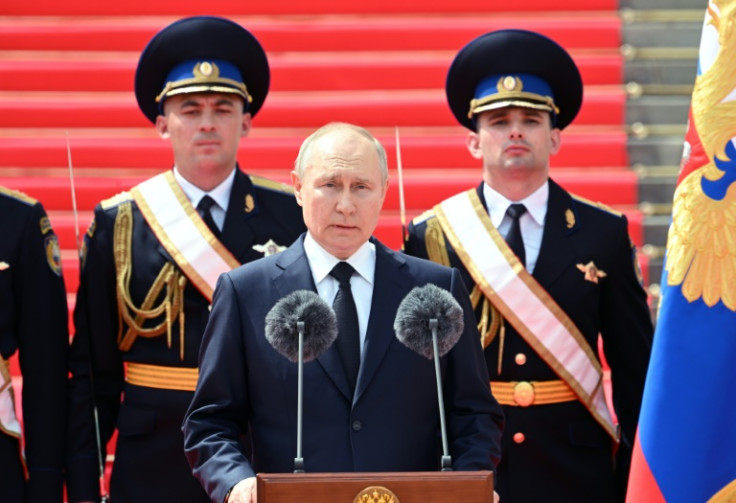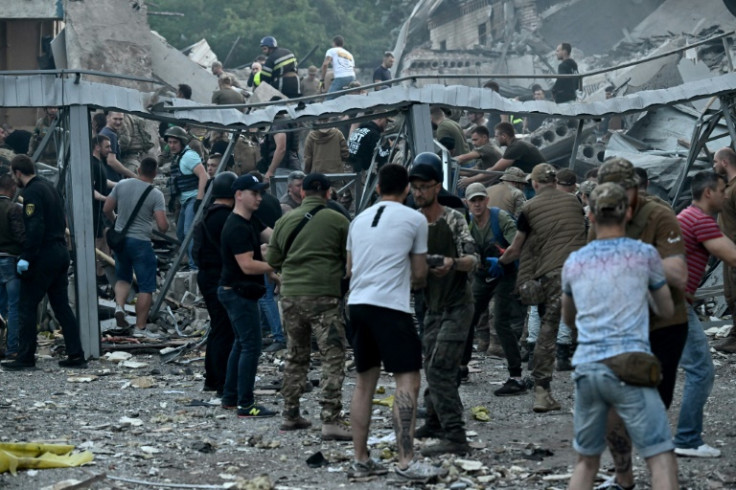Wagner chief heads into Belarus exile, NATO vows to protect allies
Belarus welcomed the head of the Wagner mercenary group Yevgeny Prigozhin into exile on Tuesday following an aborted rebellion.

Belarus welcomed the head of the Wagner mercenary group Yevgeny Prigozhin into exile on Tuesday following an aborted rebellion, as NATO warned it was ready to defend against "Moscow or Minsk".
As the fallout unfolded from Prigozhin's brief mutiny -- widely seen as the biggest threat to Kremlin authority in decades -- Russia's President Vladimir Putin sought to shore up his authority by thanking regular troops for averting a civil war.
But as Moscow announced preparations to disarm Wagner fighters, Putin's arch foe, jailed Kremlin critic Alexei Navalny, launched a stinging attack on the president in his first comments since the aborted mutiny by the paramilitaries.
"There is no bigger threat to Russia than Putin's regime," Navalny said on social media.
"Putin's regime is so dangerous to the country that even its inevitable demise will create the threat of civil war," he wrote.
In the Hague, NATO chief Jens Stoltenberg said it was still too early to draw final conclusions from the move to Belarus of Prigozhin and, likely, some of his forces, but he vowed that the alliance was ready to defend its members.
"What is absolutely clear is that we have sent a clear message to Moscow and to Minsk that NATO is there to protect every ally and every inch of NATO territory," Stoltenberg said.
Putin's supporters, however, insisted that his rule was not weakened by the revolt.

Asked whether Putin's power was diminished by the sight of Wagner's rebel mercenaries seizing a military HQ, advancing on Moscow and shooting down military aircraft along the way, Kremlin spokesman Dmitry Peskov accused political commentators of exaggerating, adding that: "We don't agree."
Putin himself attempted to portray the dramatic events at the weekend as a victory for the Russian army.
"You de facto stopped civil war," Putin told troops from the defence ministry, National Guard, FSB security service and interior ministry gathered in a Kremlin courtyard to hold a minute's silence for airmen slain by Wagner.
Prigozhin, a former Kremlin ally and catering contractor who built Russia's most powerful private army, has boasted -- with some support from news footage -- that his men were cheered by civilians during his short-lived revolt.
But Putin insisted that Wagner's ordinary fighters had seen that "the army and the people were not with them."
In a separate meeting with defence officials, Putin confirmed that Wagner was wholly funded by the Russian federal budget, despite operating as an independent company, adding that in the past year alone since the assault on Ukraine, Moscow had paid the group 86.262 billion rubles (around $1 billion) in salaries.

The feud between Wagner and the army had escalated for months, with Prigozhin making increasingly scathing statements against the generals' handling of the offensive in Ukraine, blaming them for thousands of Russian losses.
Russian officials have been trying to put the crisis behind them for three days, with the FSB dropping charges against rank-and-file Wagner troopers and the military preparing to disarm the group.
But, questions remain over how the Kremlin allowed the violence of its operation in Ukraine to spill back into Russia.
Belarus strongman Alexander Lukashenko is seeking credit for stepping in to mediate Wagner's U-turn on the road to Moscow, and on Tuesday he criticised Russia's handling of the issue.
Talking to his own military officials, Lukashenko said that Prigozhin was arriving in Belarus on Tuesday, and revealed that he had urged Putin not to kill the rogue mercenary.
"I said to Putin: we could waste him, no problem. If not on the first try, then on the second. I told him: don't do this," Lukashenko said, according to state media.
In his address, Putin also stressed that the revolt had not forced Russia to withdraw any of its units from Ukraine, where fighting continued as Kyiv's brigades pursued their counteroffensive in their nation's east and south.
The bloody conflict is now 16 months old, with mass casualties on both sides and a rising civilian toll.
On Tuesday, a Russian rocket struck a bustling restaurant in the middle of Kramatorsk, in eastern Ukraine, killing at least four people including a teenager, regional officials said.
The blast at the Ria Pizza restaurant also wounded at least 47 at the eatery, popular with both soldiers and journalists in the town of 150,000 people, one of the largest still under Ukraine control in the east.
"There was loads of blood, everyone was wounded," said Yevgen, who had been dining at the restaurant with two friends. "I couldn't understand anything, everything went dark."
"It is a war crime... it's also a gross violation of international human rights law," said Matilda Bogner, head of the mission.
Meanwhile the United States announced a new $500 million tranche of arms to bolster Ukraine's mounting counteroffensive, including armoured vehicles, precision munitions and mine-clearing equipment.

© Copyright AFP 2025. All rights reserved.





















